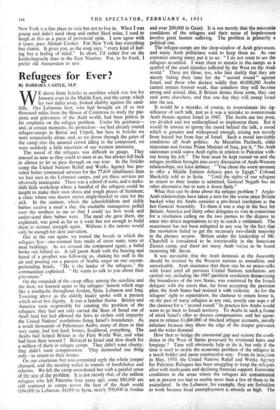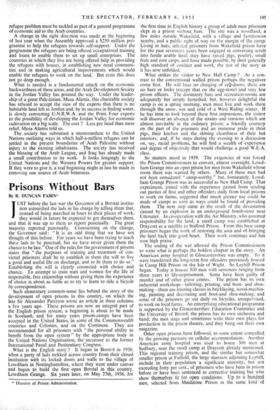Refugees for Ever?
By BARBARA CASTLE, M.P.
WE drove from Jericho in sunshine which was hot for January even in the Middle East, and the camp, which lay two miles away, looked shabby against the sand- hills. Our Lebanese host, who had brought six of us two thousand miles from the House of Commons to study the pas- sions and grievances of the Arab world, had been pitiless in his emphasis on the refugee problem. Under his guidance— and, at certain moments, his protection—we had already toured refugee-camps in Beirut and Tripoli, but here in Jericho we were temporarily alone, and, as we drove through the gates of the camp into the tattered crowd idling in the compound, we were suddenly a little uncertain of our western immunity. The mood of the refugees was difficult to gauge. They massed as near as they could to stare at us, but always fell back in silence to let us pass through on our tour. In the Jericho camp the United Nations Relief and Works Agency has pro- vided better communal services for the 77,619 inhabitants than we had seen in the Lebanese camps, and yet these services are obviously inadequate. There was a schbol of sorts, and a make- shift little workshop where a handful of the refugees could be taught to make their own shoes and rough pieces of furniture; a clinic where one doctor- strove single-handed to care for the sick. In the canteen, where the schoolchildren and sickly babies receive a meal a day, the excitable manageress pulled over the mothers to me so that I could see how weak and under-sized their babies were. The meal she gave them, she explained, was good as far as it went but not enough to build them to normal strength again. Without it the rations would only be enough for slow starvation. Out in the sun again, we toured the hovels in which the refugees live—one-roomed huts made of straw mats, tents or mud buildings. As we crossed the compound again, a babel broke out behind us. A tall gaunt Arab with the bearing and beard of a prophet was following us, shaking his staff in the air and pouring out a passion of Arabic anger on our uncom- prehending heads. "-Ile is the leader of the refugees," the commandant explained. " He wants to talk to you about their grievances." On the verandah of the camp office, among the sunshine and the dust, we listened again to the refugees' lament which nags like a toothache throughout Jordan, Syria, Lebanon and Iraq. Towering above us the elderly leader spoke with a passion which never lost dignity. It was a familiar theme. Britain and America were responsible for creating the problem of the refugees: they had not only carved the State of Israel out of Arab land but had allowed the Jews to violate with impunity the United Nations' resolutions fixing Israel's boundaries. As a result thousands of Palestinian Arabs, many of them in that very camp, had lost land, homes, livelihood, everything. The Arabs had helped Britain in the Firs't World War, and what had been their reward ? Betrayal to Israel and slow death for, a million of them in refugee camps. They didn't want charity; they didn't want compensation. They demanded one thing only—to return to their homes. On our courteous but non-committal reply the whole tempei changed, and the meeting ended in rounds of handshakes and salaams. We left the camp unmolested but with a painful sense of the size of the problem. It is not merely that, of the million refugees who left Palestine four years ago, some 880,000 are still scattered in camps across the face of the Arab world. (104,000 in Lebanon, 84,000 in Syria, nearly 500,000 in Jordan and over 200,000 in Gaza). It is not merely that the miserable conditions of the refugees and their sense of hopelessness involve great human suffering. The problem is primarily a political one.
The refugee-camps are the shop-window of Arab grievances, and many Arab politicians want to keep them so. As one extremist among many put it to us : " I do not want to see the refugees re-settled. I -want them to remain in the-camps as a symbol of the cruel injustice inflicted by the West on the Arab world." There are those, too, who hint darkly that they are merely biding their time for the " second round " against Israel, and those who declare wildly that 40,000,000 Arabs cannot remain forever weak, that somehow they will become strong and united, that, if Britain denies them arms, they can seek arms elsewhere, and that one day they will sweep Israel into the sea.
It would be a mistake, of course, to overestimate the sig- nificance of such talk, just as it was a mistake to overestimate Arab threats against Israel in 1947. The Arabs are too poor, too divided and too undisciplined to implement them. But it would be unwise to ignore the mood behind the talk, a mood which is genuine and widespread enough, arising not merely from hatred but from fear of Israel. Such a mood inevitably conditions all Arab politics. As Muzahim Pachachi, elder statesman and former Prime Minister of Iraq, put it, " No Arab statesman could waive Arab rights in relation to Palestine with- out losing his job." The heat must,-be kept turned on and the refugee problem brought into every discussion of Arab-Western relationships, not least defence. " You chose the worst moment to offer a Middle Extern defence, pact to Egypt," Colonel Sheskekly told us in Syria. " Until the rights of our refugees to return to their homes is admitted, General Neguib has no other alternative but to turn it down flatly." What then can be done about the refugee problem ? Anglo- Arab relationships have taken a turn for the worse since Britain backed what the. Arabs consider a pro-Israel resolution at the last General Assembly. To them it was -a slap in the face for Britain, America and thirty other delegates to vote in committee for a resolution calling on the two parties to the dispute to enter into direct negotiations to try to reach a settlement. The resentment has not been mitigated in any way by the fact that the resolution failed to get the necessary two-thirds majority in the plenary session. Britain tinder the leadership of Mr. Churchill is considered to be irretrievably in -the American Zionist camp, and there' are many Arab voices to be heard _ mourning Mr. Bevin.
It was inevitable that the Arab demands at the Assembly should be resisted by the Western nations as unrealistic and unrealisable. Arab insistence that there Can be no peace-talks with Israel until all previous United Nations resolutions are carried out, including the 1947-partition resolution demarcating the boundaries of the two States, was countered by the Israeli delegate with the retort that, far from accepting the partition plan, the Arab States had resisted it with violence. As for the refugees' right to repatriation, the clamour to return home is, on the part of many refugees at any rate, merely one aspe:t of the clamourfor a " second round." In practice few Arabs would want to go back to Israeli territory. To Arabs in such frame of mind Israel's offer to discuss compensation, and her agree- ment to release £1,000,000 of blocked refugee accounts, merely infuriate because they blunt the edge of the deeper grievance and the wider demand: How then to bridge the emotional gap and restore the confi- dence in the West of States possessed by irrational fears and longings ? Time will obviously help to do it, but only if the time is used to tackle the economic problem of the refugees in a much bolder and more constructive way. From its incexion in May, 1950, the United Nations Relief and Works Agency for Palestine Refugees has been struggling to keep the refugees alive with inadequate and declining,financial support. Economic conditions in the areas where the refugees are concentrated are at present too bad to enable more than a few of them to be assimilated. In the Lebanon, for example, they are forbidden to work because local unemployment is already so high. The refugee problem must be tackled as part of a general programme of economic aid to the Arab countries.
A change in the right direction was made at the beginning of last year when the Assembly approved a $250 million pro- gramme to help the refugees towards self-support. Under the programme the refugees are being offered occupational training and loans to enable them to set up small enterprises. The countries in which they live are being offered help in providing the refugees with houses, in establishing new rural communi- ties and in making agricultural improvements which would enable the refugees to work on the land. But even this does not go deep enough.
What is needed is a fundamental attack on the economic backwardness of these areas, and the Arab Development Society in the Jordan Valley has pointed the way. Under the leader- ship of a great Palestinian, Musa Alamis, this charitable society has refused to accept the view of the experts that there is no habitable land left in Jordan and, by its success in finding water, is slowly converting U.N.R.W.A. and the Point Four experts to the possibility of developing the Jordan Valley for economic cultivation on a big scale. The cost ? Less per head than mere relief, Musa Alamis told us.
The society has submitted a memorandum to the\ United Nations outlining ways in which half-a-million refugees can be settled in the present boundaries of Arab Palestine without injury to the existing inhabitants. The society has received the blessing of the Arab League, and Iraq has already' made a small contribution to its work. It looks longingly to the United Nations and the Western Powers for greater support. It they were to give it, a real beginning might at last be made in removing one source of Arab bitterness.



































 Previous page
Previous page